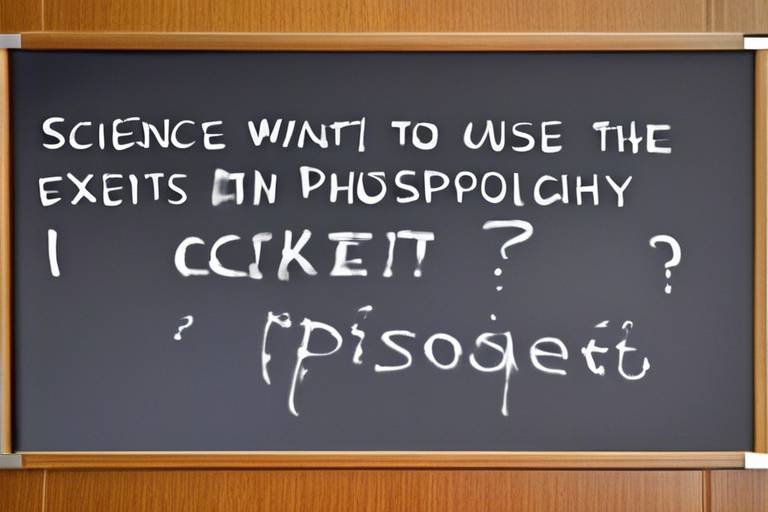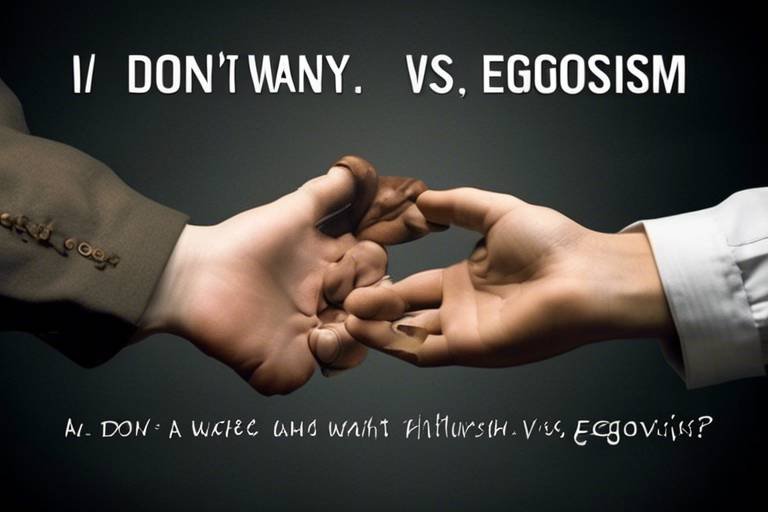The Existential Philosophy of Martin Buber
When we dive into the world of existential philosophy, one name that stands out is Martin Buber. His thoughts on human relationships and existence have sparked conversations that transcend time and culture. Buber's philosophy is not just a theoretical framework; it's a lens through which we can examine our interactions, our spirituality, and ultimately, our very being. Imagine standing at a crossroads, where one path leads to isolation and the other to profound connection. Buber invites us to take the path of connection, where we encounter the essence of what it means to be human.
At the heart of Buber's philosophy lies the distinction between two fundamental modes of existence: the I-Thou relationship and the I-It relationship. These concepts serve as the foundation for understanding how we relate to ourselves, others, and the world around us. In a world that often feels fragmented, Buber's ideas remind us that our existence is deeply intertwined with the connections we forge. Through genuine dialogue and mutual recognition, we can transcend the superficiality of everyday interactions and engage in a dance of existence that is rich, meaningful, and alive.
As we explore Buber's existential philosophy, we will uncover the implications of these relationships for our understanding of spirituality and human connection. Buber challenges us to rethink our approach to existence, urging us to embrace a relational perspective that honors the sacredness of every interaction. So, buckle up as we embark on this journey into the depths of Buber's thought, where the essence of being human unfolds in the tapestry of relationships.
Buber's concept of the I-Thou relationship is a profound exploration of genuine dialogue and mutual recognition. It's like stepping into a vibrant conversation where both parties are fully present, not just exchanging words but sharing their very essence. In this relational framework, individuals are not mere objects or tools; they are seen and valued for who they are. This is a stark contrast to the transactional nature of the I-It relationship, where interactions are reduced to utilitarian exchanges.
In an I-Thou relationship, the connection goes beyond words. It's about experiencing the other person as a whole being, acknowledging their feelings, thoughts, and existence. This kind of relationship fosters a sense of belonging and community, creating a space where individuals can grow and flourish. It's like the difference between a fleeting glance and a deep gaze that sees into the soul. The significance of this relational framework cannot be overstated; it is essential for understanding what it means to be truly alive.
On the flip side, we encounter the I-It perspective, which reduces others to mere objects or instruments for our own purposes. This perspective can lead to a sense of alienation and disconnection, as it strips away the richness of human experience. When we view others through the lens of I-It, we miss out on the beauty of shared existence and the potential for deep connections.
Consider how this perspective manifests in our daily lives. How often do we engage with others solely based on what they can offer us? This transactional view can create a void, leaving us feeling isolated even in a crowded room. Buber's philosophy challenges us to recognize the implications of viewing relationships through this lens. It prompts us to ask ourselves: Are we truly connecting with others, or are we merely existing alongside them?
Dialogue is the lifeblood of Buber's philosophy. It's through authentic communication that I-Thou relationships are born. When we engage in meaningful dialogue, we open the door to understanding and connection. It's not just about exchanging ideas; it's about sharing our truths, our vulnerabilities, and our experiences. This kind of dialogue requires active listening, where we genuinely seek to understand the other person rather than simply waiting for our turn to speak.
Active listening is a transformative practice that can change the dynamics of our relationships. It allows us to engage fully with one another, creating a space where both parties feel valued and heard. Imagine a conversation where each participant is fully present, their attention focused not on their own thoughts but on the other person. This is the power of active listening; it cultivates meaningful connections that enrich our lives.
At the core of I-Thou relationships is the concept of mutual recognition. This means acknowledging the existence and worth of the other person. When we recognize someone as a fellow being, we affirm their humanity and create a foundation for deeper connections. It's like shining a light on the shared experience of being alive, fostering a sense of belonging and understanding that transcends individual differences.
Buber's philosophy challenges us to find meaning through relationships rather than in isolation. In a world that often emphasizes individualism, Buber's ideas remind us that our existence is intertwined with the connections we cultivate. When we engage with others authentically, we open ourselves up to a world of possibilities and insights that enrich our understanding of life. Existential questions about purpose and meaning are best addressed within the context of our relationships, reminding us that we are not alone in our quest for understanding.
Buber's existential philosophy has profound implications for spirituality, emphasizing the sacredness of relationships. His ideas resonate with various spiritual practices, encouraging individuals to view their connections as pathways to deeper spiritual understanding. The notion that every interaction holds the potential for spiritual growth transforms our perspective on the mundane.
Relational spirituality aligns closely with Buber's philosophy, focusing on the interconnectedness of all beings. This perspective invites us to cultivate relationships that lead to a deeper spiritual experience. When we recognize the divine in others, we create a space for spiritual growth that transcends individual beliefs and practices.
Buber's ideas continue to resonate with contemporary existentialist thought, bridging gaps between philosophy and psychology. His work contributes to ongoing discussions about the nature of existence, urging us to consider the relational aspects of our lives. As we navigate the complexities of modern existence, Buber's insights remind us of the importance of connection in our search for meaning.
- What is the main idea behind Buber's I-Thou relationship?
Buber's I-Thou relationship emphasizes genuine connection and mutual recognition, allowing individuals to engage deeply with one another. - How does the I-It perspective affect our relationships?
The I-It perspective reduces others to objects, leading to alienation and disconnection, which can negatively impact our sense of community. - Why is dialogue important in Buber's philosophy?
Dialogue fosters authentic communication, which is essential for forming I-Thou relationships and creating meaningful connections. - What role does active listening play in relationships?
Active listening transforms conversations by allowing individuals to fully engage with one another, promoting understanding and connection. - How does Buber's philosophy influence spirituality?
Buber's thought emphasizes the sacredness of relationships, suggesting that our connections can lead to deeper spiritual understanding.

The Essence of I-Thou Relationships
In the realm of existential philosophy, Martin Buber's concept of the I-Thou relationship stands as a beacon of genuine human connection. Unlike the superficial interactions that often characterize our daily lives, the I-Thou relationship is rooted in mutual recognition and profound dialogue. Imagine sitting across from a friend, not merely exchanging pleasantries, but engaging in a deep conversation where both souls resonate with each other's experiences. This is the essence of I-Thou—an encounter that transcends the ordinary and touches the divine.
Buber argues that in an I-Thou relationship, individuals are seen as whole beings, rich with emotions, thoughts, and experiences. This perspective fosters a sense of belonging and connection that is often lacking in our fast-paced, transactional world. When we engage with others as Thou, we acknowledge their inherent worth and uniqueness. It’s like looking into a mirror that reflects not just the surface, but the depths of another person’s being.
To further understand this relational framework, we can contrast it with the I-It perspective, which reduces others to mere objects or tools for our own purposes. In an I-It relationship, people are often viewed through a lens of utility, leading to feelings of alienation and disconnection. Think about it: have you ever felt like just another cog in the machine? That’s the I-It mentality at play. It strips away the richness of human interaction and leaves us feeling isolated.
In essence, the I-Thou relationship is about authenticity and presence. It invites us to be fully engaged and to listen deeply. This kind of connection is not just beneficial for personal relationships; it has profound implications for our communities and society as a whole. When we foster I-Thou relationships, we create an environment where empathy and understanding flourish, paving the way for a more compassionate world.
Ultimately, embracing the I-Thou framework encourages us to seek deeper connections with those around us. It challenges us to move beyond the surface and to engage in meaningful dialogues that enrich our lives. Just as a flower needs sunlight to bloom, our relationships require the light of recognition and respect to thrive. In a world often dominated by the I-It perspective, the I-Thou relationship offers a refreshing and vital alternative that can transform our existence.

The I-It Perspective
In the realm of existential philosophy, Martin Buber introduces a compelling dichotomy between the I-Thou and I-It relationships. While the former fosters genuine connections, the latter reduces our interactions to mere transactions. When we engage with others through the I-It lens, we strip them of their humanity, viewing them as objects rather than as individuals with their own thoughts, feelings, and experiences. This perspective can lead to a profound sense of alienation, not just for the individual being objectified, but for the one engaging in this superficial interaction as well.
Consider the implications of seeing someone as an I-It entity. It’s akin to treating a person like a tool—useful only for what they can provide or accomplish. This transactional approach can manifest in various aspects of life, from professional environments where colleagues become mere resources, to personal relationships where partners are seen as possessions rather than equals. In such scenarios, the richness of human experience is diminished, leading to a culture where genuine connection is sacrificed on the altar of convenience.
To illustrate this further, let’s look at some common characteristics of I-It relationships:
- Objectification: Individuals are viewed as means to an end.
- Lack of Empathy: Emotional engagement is minimal, if present at all.
- Transactional Nature: Interactions are based on what can be gained rather than shared experiences.
- Isolation: Such relationships can lead to feelings of loneliness and disconnection.
When we adopt the I-It perspective, we not only diminish others but also ourselves. Our capacity for empathy and understanding shrinks, leading to a life that feels hollow and disconnected. The world becomes a series of transactions rather than a tapestry of rich human experiences. This alienation can have profound implications on our mental health, leading to feelings of depression and anxiety as we navigate a world where authentic connections are scarce.
Moreover, the I-It view is not just a personal issue; it permeates society at large. In a culture that increasingly values efficiency and productivity over personal connection, we find ourselves in a constant state of disconnection. Relationships become transactional, and the sacredness of human interaction is lost. This can be particularly evident in digital communications, where the screen often serves as a barrier, further entrenching the I-It mentality.
In conclusion, the I-It perspective represents a significant challenge to our understanding of existence and relationships. It highlights the dangers of reducing individuals to mere objects and serves as a reminder of the importance of striving for I-Thou relationships. By recognizing the value of genuine connection, we can begin to combat the alienation that comes from an I-It worldview and work towards a more fulfilling and interconnected existence.
What is the main difference between I-Thou and I-It relationships?
The main difference lies in the depth of connection. I-Thou relationships are characterized by mutual recognition and genuine dialogue, whereas I-It relationships reduce individuals to objects, leading to alienation.
How does the I-It perspective affect mental health?
Engaging in I-It relationships can lead to feelings of isolation and disconnection, which may contribute to mental health issues such as anxiety and depression.
Can the I-It perspective be changed?
Yes, by consciously striving for I-Thou interactions, individuals can cultivate deeper connections and foster a more meaningful existence.

The Role of Dialogue
At the heart of Martin Buber's existential philosophy lies the concept of dialogue, which he views as the lifeblood of genuine relationships. Dialogue is not merely the exchange of words; rather, it is a profound interaction that fosters understanding and connection. Imagine two people standing on opposite sides of a river, each shouting their thoughts across the rushing water. This is often how communication happens in our fast-paced world—loud, chaotic, and disconnected. Now, picture those same individuals stepping onto a bridge, engaging in a heartfelt conversation, where they truly listen to one another. This bridge symbolizes dialogue in Buber's philosophy, where the barriers of misunderstanding dissolve, allowing for the emergence of authentic relationships.
Buber emphasizes that for dialogue to be meaningful, it must be rooted in authenticity. This means that individuals must approach each other with openness, vulnerability, and a willingness to engage fully. When we enter into dialogue, we are not just presenting our viewpoints; we are inviting the other person into our world and allowing them to share theirs. This mutual exchange creates a space where both individuals can grow and evolve. It's like planting a garden together—each person brings their unique seeds (thoughts and feelings), and through dialogue, they cultivate a rich and diverse landscape of understanding.
Furthermore, Buber argues that dialogue is transformative. It has the power to change not only our perceptions of others but also our understanding of ourselves. When we engage in meaningful conversations, we are challenged to reflect on our beliefs and values, leading to personal growth. In this sense, dialogue acts as a mirror, reflecting not only the other person’s essence but also revealing aspects of ourselves that we may not have recognized before.
To illustrate the significance of dialogue, consider the following key elements that Buber identifies as essential for fostering true connection:
- Active Listening: This is more than just hearing words; it involves fully engaging with the speaker, understanding their message, and responding thoughtfully.
- Empathy: Placing oneself in the other’s shoes allows for a deeper understanding of their experiences and emotions.
- Openness: Being willing to share one’s own thoughts and feelings fosters trust and encourages the other person to do the same.
In essence, Buber’s notion of dialogue is a call to action for us to engage more deeply with those around us. It challenges us to move beyond superficial conversations and to truly connect with others on a human level. Just as a musician harmonizes with their fellow players to create a beautiful symphony, we too can create a richer existence through the art of dialogue. It is through these interactions that we can bridge the gaps of misunderstanding and build a more connected and compassionate world.
- What is the significance of dialogue in Buber's philosophy?
Dialogue is essential for forming genuine relationships, allowing for mutual understanding and personal growth. - How does active listening contribute to effective dialogue?
Active listening fosters deeper engagement and understanding, making the dialogue more meaningful. - Can dialogue lead to personal transformation?
Yes, through meaningful conversations, individuals can gain insights into themselves and grow personally.

The Importance of Listening
Listening is not just a passive act; it’s a powerful tool that can transform our relationships and our understanding of one another. In the realm of Martin Buber's philosophy, listening takes center stage as a vital component of the I-Thou relationship. When we listen actively, we engage with others on a deeper level, moving beyond superficial exchanges to foster genuine connections. Imagine a conversation where both parties are fully present—where each word spoken is met with thoughtful consideration. This is the essence of authentic dialogue that Buber champions.
But why is listening so crucial? Well, think of it this way: when we truly listen, we create a space where the other person feels valued and understood. This experience can be likened to a warm embrace; it wraps the speaker in a sense of safety and recognition. In contrast, when we merely hear words without engaging, we risk reducing the conversation to a transactional interaction, akin to a bank teller processing a deposit. There’s no warmth, no connection—just a mechanical exchange.
Moreover, listening is a skill that requires practice and intention. It involves more than just hearing sounds; it demands our full attention. Here are some key aspects that highlight the importance of listening:
- Empathy: Active listening allows us to step into another's shoes, fostering empathy and understanding.
- Validation: By listening, we validate the other person's feelings and experiences, affirming their worth.
- Clarity: It helps clarify thoughts and emotions, paving the way for deeper conversations.
In Buber's view, listening is a form of respect, a recognition of the other as a unique being with their own thoughts and feelings. It’s through listening that we can truly engage in the I-Thou relationship, where both individuals are seen and heard. This mutual recognition is essential for nurturing meaningful connections, as it allows us to explore the depths of our existence together.
Ultimately, the act of listening can be transformative. It can bridge gaps, heal wounds, and create a sense of belonging. When we prioritize listening in our interactions, we not only enrich our relationships but also enhance our own understanding of the world around us. In a society where distractions abound, the ability to listen deeply is a gift we can cultivate, one that embodies the spirit of Buber's philosophy.

Mutual Recognition
In the realm of Martin Buber's existential philosophy, stands as a cornerstone of the I-Thou relationship. It’s not just about seeing someone; it’s about truly acknowledging their existence and worth. Imagine walking through a crowded street, where everyone is absorbed in their own world, glued to their phones. Now, picture a moment where someone looks up, meets your gaze, and you both share a brief smile. That fleeting exchange is a glimpse into the power of mutual recognition—it’s a moment where two souls connect, even if just for an instant.
Mutual recognition goes beyond mere acknowledgment; it involves a deep understanding that the other person is not just a backdrop in our lives but a significant being with their own thoughts, feelings, and experiences. Buber argues that in recognizing others, we affirm their humanity and, in turn, our own. This acknowledgment can lead to transformative experiences, fostering a sense of belonging and community.
But how does this work in practice? Consider the following aspects of mutual recognition:
- Affirmation of Existence: Recognizing another person means affirming that they have their own unique existence, which is just as valuable as ours.
- Empathy and Understanding: When we engage in mutual recognition, we open ourselves up to understanding the emotions and experiences of others, creating a bridge of empathy.
- Building Connections: This recognition lays the groundwork for deeper relationships, as it encourages trust and vulnerability.
In a world that often emphasizes individualism and self-interest, Buber’s idea of mutual recognition serves as a gentle reminder that we are all interconnected. It challenges us to look beyond our own perspectives and to engage with others in a meaningful way. This engagement is not merely a social nicety; it is a fundamental aspect of our existence.
Ultimately, mutual recognition enriches our lives and contributes to a more profound understanding of what it means to be human. It invites us to participate in a shared journey, where each person’s story matters, and every connection has the potential to illuminate our paths. Embracing this philosophy can lead to a more compassionate and connected world, where relationships are cherished and nurtured.
- What is mutual recognition in Buber's philosophy? Mutual recognition refers to the acknowledgment of another person’s existence and worth, fostering deep connections and understanding.
- How does mutual recognition affect relationships? It enhances relationships by promoting empathy, trust, and a sense of belonging, leading to more meaningful interactions.
- Can mutual recognition be practiced in everyday life? Absolutely! Simple gestures like eye contact, active listening, and genuine conversations can cultivate mutual recognition in our daily interactions.

Existence and Meaning
Martin Buber’s philosophy invites us to explore the profound relationship between existence and meaning. He challenges us to consider that our search for meaning is not an isolated endeavor but rather a journey best undertaken in the company of others. In a world that often feels fragmented, Buber’s thoughts remind us that the essence of being lies within our connections. When we engage in genuine relationships, we find a deeper significance in our existence. It’s as if every interaction becomes a thread in the rich tapestry of our lives, weaving together experiences that define who we are.
At the heart of Buber’s existential inquiry is the idea that meaning is not something we can grasp in solitude. Instead, it emerges through our interactions with others. This perspective can be likened to a dance, where each partner influences the rhythm and flow of the performance. Just as dancers must attune to one another to create harmony, we must engage with others to uncover the layers of meaning that exist in our lives. In this relational framework, Buber posits that our understanding of existence is intimately tied to our capacity for empathy, dialogue, and shared experiences.
In examining the nature of existence, Buber encourages us to confront some critical questions:
- What does it mean to truly exist?
- How do our relationships shape our perception of reality?
- Can we find meaning in isolation, or is it inherently relational?
These questions lead us to the realization that the essence of being is about more than just individual experiences; it’s about the collective journey we embark upon with others. Buber’s concept of the I-Thou relationship suggests that when we engage with others as whole beings, we open ourselves to a richer understanding of existence. This connection allows us to transcend our individual perspectives, creating a shared reality that is both profound and transformative.
Moreover, Buber’s insights challenge the notion that meaning is a static concept. Instead, he proposes that meaning is dynamic, evolving through our interactions and experiences. Just as a river flows and changes course, so too does our understanding of existence shift as we connect with others. This fluidity encourages us to embrace the uncertainties of life, recognizing that each relationship offers new possibilities for growth and understanding.
In conclusion, Buber’s exploration of existence and meaning emphasizes the necessity of relationships in our quest for significance. By fostering authentic connections with others, we not only enrich our own lives but also contribute to a shared tapestry of meaning that binds us all. In a world that often prioritizes individualism, Buber’s philosophy serves as a powerful reminder of the importance of community, dialogue, and mutual recognition in our pursuit of a meaningful existence.
- What is the main idea behind Buber's philosophy? Buber's philosophy emphasizes the importance of relationships in finding meaning and understanding existence.
- How do I-Thou and I-It relationships differ? I-Thou relationships foster genuine connections, while I-It relationships reduce others to objects, leading to disconnection.
- Can I find meaning in isolation? According to Buber, meaning is best found through relationships rather than isolation.

The Impact of Buber's Thought on Spirituality
Martin Buber’s existential philosophy profoundly influences our understanding of spirituality, primarily through his emphasis on the sacredness of relationships. Buber believed that true spirituality is not found in isolation but rather in the connections we forge with others. This perspective invites us to rethink our spiritual practices, urging us to view each interaction as an opportunity for a deeper, more meaningful engagement with the world around us.
At the heart of Buber's thought is the idea that spirituality is relational. When we engage in I-Thou relationships, we recognize the divine in each other, creating a space where authentic dialogue can flourish. This notion aligns with many spiritual traditions that emphasize the importance of community and interconnectedness. For instance, in various religious practices, the act of coming together—whether in prayer, meditation, or communal gatherings—serves to strengthen our bonds and elevate our spiritual experiences.
Moreover, Buber’s philosophy challenges us to see the interconnectedness of all beings. He posited that every interaction is a chance to encounter the sacred, transforming mundane moments into profound spiritual experiences. Just as a pebble creates ripples in water, our relationships can extend beyond ourselves, affecting the broader community and the world. This understanding encourages a more compassionate approach to spirituality, where we actively seek to uplift and recognize the worth of others.
In practical terms, Buber’s ideas can be integrated into various spiritual practices. For example, many meditation techniques emphasize mindfulness and presence, which resonate with Buber's call for genuine engagement with others. By practicing active listening and mutual recognition, individuals can cultivate a spiritual atmosphere that honors the essence of each person they encounter.
Furthermore, Buber's thought invites us to explore how our relationships can serve as a pathway to personal and collective transformation. The act of seeing others as whole beings, rather than mere objects, opens the door to profound spiritual growth. This relational spirituality fosters a sense of belonging and interconnectedness that can be both healing and enriching.
Ultimately, Buber’s existential philosophy offers a refreshing lens through which to view spirituality. It encourages us to step outside our individualistic tendencies and embrace a more communal approach. By recognizing the divine in our interactions, we not only enrich our spiritual lives but also contribute to a more compassionate and understanding world.
- What is the essence of Buber's philosophy? Buber's philosophy emphasizes the importance of relationships, particularly the I-Thou relationship, which fosters genuine connection and mutual recognition.
- How does Buber’s thought influence spirituality? His ideas promote the notion that spirituality is found in relationships, encouraging individuals to see the sacred in their interactions with others.
- Can Buber's philosophy be applied to modern spiritual practices? Yes, Buber's emphasis on dialogue and mutual recognition can enhance various spiritual practices, making them more meaningful and connected.

Relational Spirituality
Relational spirituality is a fascinating concept that resonates deeply with Martin Buber's existential philosophy. At its core, this idea emphasizes the interconnectedness of all beings, suggesting that our relationships are not merely social constructs but rather essential components of our spiritual existence. Imagine for a moment that each connection we forge is like a thread in a vast tapestry; each thread adds color and depth, creating a rich, intricate design that reflects the essence of life itself. In this way, our relationships become the very fabric of our spiritual journey.
Buber posits that through authentic relationships, we encounter the divine. When we engage with others in a meaningful way, we open ourselves to a greater understanding of existence and purpose. This perspective challenges the often individualistic approach to spirituality that dominates modern society. Instead of seeking enlightenment in isolation, relational spirituality invites us to find it within the context of community and connection. It encourages us to see the sacred in our interactions, transforming everyday encounters into profound spiritual experiences.
One of the key aspects of relational spirituality is the idea of mutual recognition. When we genuinely acknowledge the existence and worth of others, we not only affirm their humanity but also deepen our own spiritual awareness. This mutual recognition fosters an environment where individuals feel valued and seen, creating a safe space for vulnerability and growth. In this context, spirituality becomes a shared journey rather than a solitary pursuit.
Furthermore, relational spirituality aligns beautifully with various spiritual practices and beliefs across cultures. For instance, many indigenous traditions emphasize the importance of community and interconnectedness, viewing the universe as a web of relationships. Similarly, in many Eastern philosophies, the concept of unity and interdependence is central to spiritual understanding. Buber's ideas serve as a bridge, connecting these diverse spiritual practices through the common thread of relationality.
To illustrate the impact of relational spirituality, consider the following table that highlights key elements:
| Element | Description |
|---|---|
| Interconnectedness | The idea that all beings are linked and influence one another. |
| Mutual Recognition | Acknowledging and valuing the existence of others. |
| Shared Spiritual Journey | Finding meaning and purpose through collective experiences. |
| Transformative Relationships | Relationships that foster growth, understanding, and deeper connections. |
In conclusion, relational spirituality profoundly enriches our understanding of existence through the lens of connection and community. By embracing Buber's philosophy, we can cultivate relationships that not only enhance our spiritual lives but also contribute to a more compassionate and understanding world. So, the next time you engage with someone, remember that you are not just interacting; you are participating in a sacred dance of existence, weaving together the threads of life into a beautiful tapestry of shared meaning.
- What is relational spirituality? Relational spirituality emphasizes the importance of connections between individuals as a means of finding spiritual meaning and understanding.
- How does Martin Buber's philosophy relate to spirituality? Buber's philosophy highlights the significance of authentic relationships and mutual recognition, suggesting that spirituality is deeply rooted in our interactions with others.
- Can relational spirituality be applied in modern life? Absolutely! By fostering genuine connections and recognizing the worth of others, we can enhance our spiritual experiences and contribute to a more connected society.

Buber and Modern Existentialism
Martin Buber's existential philosophy has not only shaped the landscape of human relationships but has also left a significant mark on the realm of modern existentialism. His ideas resonate deeply with contemporary thinkers who grapple with the complexities of existence and the human condition. At the heart of Buber's philosophy is the notion that our relationships define our reality, a perspective that aligns closely with existentialist themes. But how exactly does Buber's thought intertwine with modern existentialism?
To understand this connection, we must first recognize that existentialism is fundamentally concerned with individual experience and the search for meaning in an often absurd world. Buber's emphasis on the I-Thou relationship invites us to consider the profound impact of interpersonal connections on our sense of self and purpose. In a world where many feel isolated, Buber’s call to engage authentically with others becomes a vital antidote to existential despair.
Moreover, Buber's work encourages a shift from viewing existence as a solitary journey to embracing the idea that we are all part of a larger tapestry of life. This perspective is echoed in the writings of modern existentialists who argue that our identities are shaped through our interactions with others. In this sense, Buber’s philosophy enhances our understanding of existentialism by adding a relational dimension, suggesting that meaning is not found in isolation but in the connections we forge.
Another significant aspect of Buber's influence on modern existentialism is his exploration of the sacredness of relationships. He posits that in every genuine encounter, there lies the potential for transcendence—a concept that resonates with existentialist ideas about the search for authenticity and the embrace of the present moment. By recognizing the divine in our interactions, Buber offers a pathway to a more profound sense of existence that many contemporary existentialists seek.
Furthermore, Buber’s ideas challenge the often nihilistic tendencies found in some strands of modern existential thought. Instead of succumbing to despair, he advocates for a life enriched by the mutual recognition of others. This highlights a crucial distinction between Buber’s optimistic relational approach and the more pessimistic views of some existentialists. Buber’s philosophy serves as a reminder that even in a fragmented world, we can find meaning through our connections.
In conclusion, Martin Buber's existential philosophy not only complements but also enriches modern existentialism. His focus on relationships as the foundation of existence encourages us to look beyond ourselves and engage with the world around us. As we navigate the complexities of modern life, Buber's insights remind us that the quest for meaning is a shared journey, one that is best undertaken in the company of others.
- What is the main focus of Buber's philosophy?
Buber's philosophy centers on the nature of human relationships, particularly the distinction between I-Thou and I-It interactions. - How does Buber's thought influence modern existentialism?
Buber emphasizes relationality and mutual recognition, which enhances the understanding of existence in modern existential thought. - What is the significance of the I-Thou relationship?
The I-Thou relationship fosters genuine dialogue and connection, transcending mere transactional interactions. - Can Buber's ideas be applied to spirituality?
Yes, Buber's philosophy underscores the sacredness of relationships, influencing various spiritual practices and beliefs.
Frequently Asked Questions
- What is the core idea behind Martin Buber's I-Thou relationship?
The I-Thou relationship is all about genuine dialogue and mutual recognition. It emphasizes the importance of seeing others as whole beings rather than mere objects. This connection fosters deep, meaningful interactions that go beyond simple transactions, allowing us to truly engage with one another.
- How does the I-It perspective affect our relationships?
The I-It perspective reduces individuals to objects, stripping away the essence of who they are. This view can lead to feelings of alienation and disconnection, making it difficult to form authentic relationships. In a world where we often treat others as tools or means to an end, Buber challenges us to reconsider how we engage with one another.
- Why is dialogue so important in Buber's philosophy?
Dialogue acts as a bridge that connects individuals, creating the space for I-Thou relationships to flourish. Through authentic communication, we can foster understanding and empathy, which are crucial for building meaningful connections. It's through these conversations that we truly recognize and appreciate each other's existence.
- What role does listening play in forming I-Thou relationships?
Listening is a transformative act that allows us to engage fully with others. When we listen actively, we validate the experiences and feelings of those around us, which deepens our connections. It's not just about hearing words; it's about understanding the person behind those words.
- How does mutual recognition impact our interactions?
Mutual recognition is essential for affirming the existence and worth of others. By acknowledging the presence of another person, we create a shared sense of being that enriches our relationships. This recognition fosters a deeper connection, allowing us to experience the fullness of human interaction.
- What does Buber mean by finding meaning through relationships?
Buber's philosophy suggests that instead of isolating ourselves, we should seek meaning through our connections with others. Our relationships are not just a backdrop to our existence; they are central to understanding who we are and what gives our lives purpose.
- How does Buber's thought influence spirituality?
Buber's existential philosophy highlights the sacredness of relationships, suggesting that our connections with others can lead to profound spiritual experiences. His ideas encourage us to view spirituality as relational, emphasizing that our interactions with others can deepen our understanding of the divine.
- What is relational spirituality according to Buber?
Relational spirituality is the idea that all beings are interconnected. It aligns with Buber's philosophy, suggesting that cultivating relationships can enhance our spiritual understanding and experience. By recognizing our interconnectedness, we can foster a deeper sense of belonging and purpose.
- How does Buber's philosophy relate to modern existentialism?
Buber's ideas resonate with contemporary existentialist thought, bridging the gap between philosophy and psychology. His work contributes to ongoing discussions in existentialism by emphasizing the importance of relationships in understanding human existence and meaning.



















